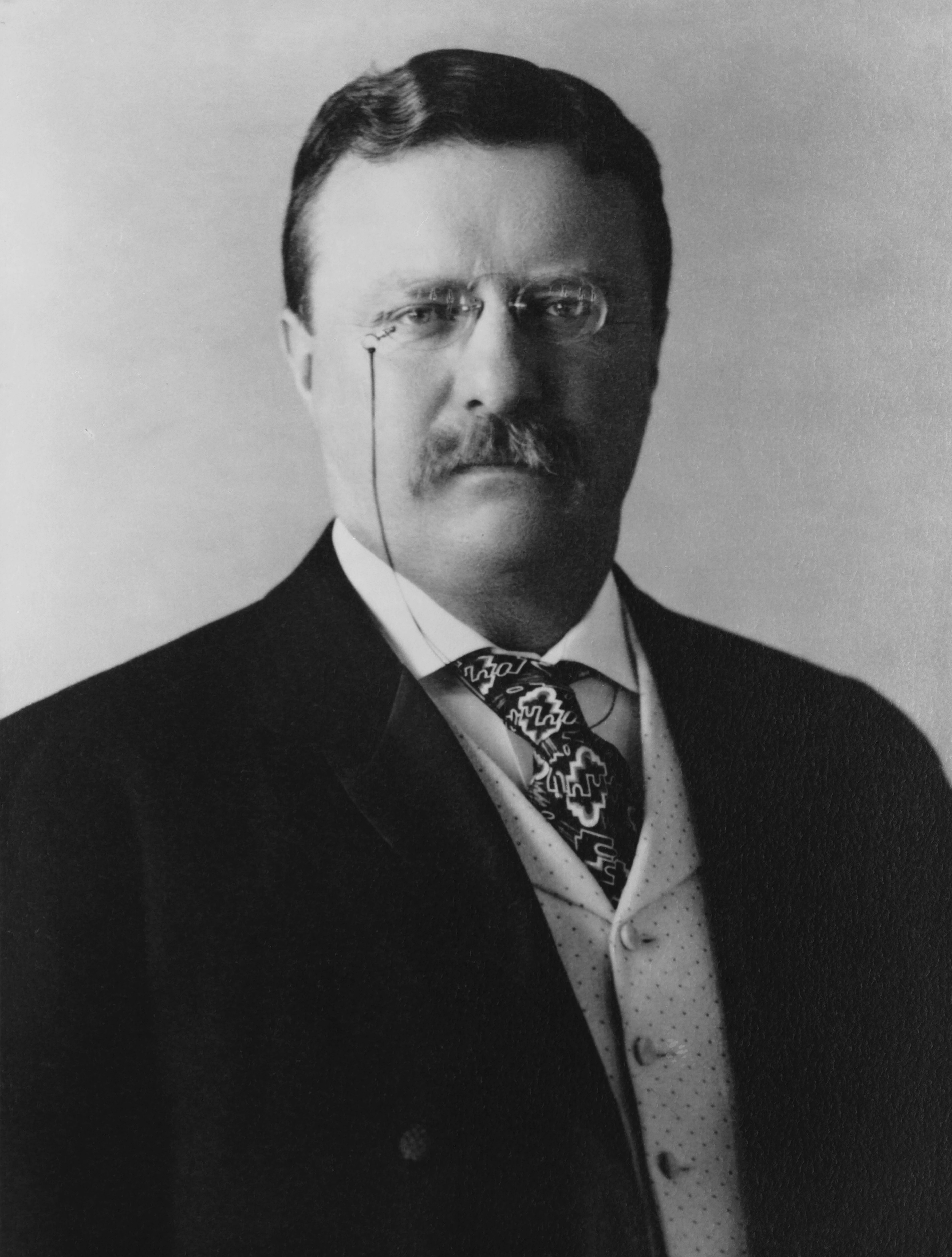Theodore Roosevelt frasi celebri
Theodore Roosevelt Frasi e Citazioni
Origine: Citato in Marco Pastonesi e Giorgio Terruzzi, Palla lunga e pedalare, Dalai Editore, 1992, p. 83. ISBN 88-8598-826-2
Origine: 1901, pp. 246-47; citato in Losurdo 2005, p. 299.
“Nessun trionfo di pace è più esaltante di un trionfo di guerra.”
Origine: Citato in Focus, n. 85, p. 180.
parlando di come stroncare scioperi e conflitti sociali: citato in Hofstadter 1960, p. 216; citato in Losurdo 2005, p. 323
Theodore Roosevelt: Frasi in inglese
1900s, Letter to Winfield T. Durbin (1903)
1910s, The World Movement (1910)
1910s, The Progressives, Past and Present (1910)
1900s, Letter to Winfield T. Durbin (1903)
1910s, Citizenship in a Republic (1910)
“The worst lesson that can be taught a man is to rely upon others and to whine over his sufferings.”
"How Not To Better Social Conditions" in Review of Reviews (January 1897), p. 39 https://books.google.com/books?id=J2FAAQAAMAAJ&pg=PA39 · Full text online (with at least two typos — in the last sentence of the article) as "How Not To Help Our Poor Brother" http://www.theodore-roosevelt.com/images/research/speeches/trhnthopb.pdf
1890s
1900s, "In God we Trust" letter (1907)
1910s, The Progressives, Past and Present (1910)
1900s, Letter to Winfield T. Durbin (1903)
1910s, The World Movement (1910)
Origine: 1910s, Fear God and Take Your Own Part (1916), p. 26
1900s, The Strenuous Life: Essays and Addresses (1900), The Strenuous Life
Variante: Far better is it to dare mighty things, to win glorious triumphs, even though checkered by failure... than to rank with those poor spirits who neither enjoy nor suffer much, because they live in a gray twilight that knows not victory nor defeat.
1900s, A Square Deal (1903)
1910s, The World Movement (1910)
1910s, Citizenship in a Republic (1910)
1900s, Address at the Prize Day Exercises at Groton School (1904)
Speech to the Brotherhood of Locomotive Firemen in Chattanooga, Tennessee (8 September 2013). http://books.google.de/books?id=7_3uugarOF0C&pg=PA105&lpg=PA105&dq=theodore+roosevelt+I+don't+pity+any+man+who+does+hard+work+worth+doing.+I+admire+him.+I+pity+the+creature+who+does+not+work,+at+whichever+end+of+the+social+scale+he+may+regard+himself+as+being.&source=bl&ots=seVM4pX9IN&sig=gd7yTZMy3X2h6rIgQVVp5uR0Xu4&hl=de&sa=X&ei=M5FZUvW4M8LXtQby1YD4AQ&ved=0CG8Q6AEwCTgK#v=onepage&q=theodore%20roosevelt%20I%20don't%20pity%20any%20man%20who%20does%20hard%20work%20worth%20doing.%20I%20admire%20him.%20I%20pity%20the%20creature%20who%20does%20not%20work%2C%20at%20whichever%20end%20of%20the%20social%20scale%20he%20may%20regard%20himself%20as%20being.&f=false
1900s
1910s, The Progressives, Past and Present (1910)
Origine: 1910s, Theodore Roosevelt — An Autobiography (1913), Ch. VIII : The New York Governorship
1900s, The Strenuous Life: Essays and Addresses (1900), National Duties
As quoted in speech by Edward de Veaux Morrell https://cdn.loc.gov/service/rbc/lcrbmrp/t2609/t2609.pdf (April 1904)
1900s
1910s, Address to the Knights of Columbus (1915)
"The Progressive Covenant With The People" http://memory.loc.gov/cgi-bin/query/r?ammem/papr:@filreq(@field(NUMBER+@band(trrs+1146))+@field(COLLID+roosevelt)) speech (August 1912)
1910s
Contesto: Political parties exist to secure responsible government and to execute the will of the people. From these great tasks both of the old parties have turned aside. Instead of instruments to promote the general welfare they have become the tools of corrupt interests, which use them impartially to serve their selfish purposes. Behind the ostensible government sits enthroned an invisible government owing no allegiance and acknowledging no responsibility to the people. To destroy this invisible government, to dissolve the unholy alliance between corrupt business and corrupt politics, is the first task of the statesmanship of the day.
Ch. XV : The Peace of Righteousness http://books.google.com/books?id=Io4fAAAAIAAJ&q=%22The+only+safe+rule+is+to+promise+little+and+faithfully+to+keep+every+promise+to+speak+softly+and+carry+a+big+stick%22&pg=PA537#v=onepage
1910s, Theodore Roosevelt — An Autobiography (1913)
1910s, The New Nationalism (1910)
1910s, Address to the Knights of Columbus (1915)
Contesto: For thirty-five years I have been more or less actively engaged in public life, in the performance of my political duties, now in a public position, now in a private position. I have fought with all the fervor I possessed for the various causes in which with all my heart I believed; and in every fight I thus made I have had with me and against me Catholics, Protestants, and Jews. There have been times when I have had to make the fight for or against some man of each creed on ground of plain public morality, unconnected with questions of public policy. There were other times when I have made such a fight for or against a given man, not on grounds of public morality, for he may have been morally a good man, but on account of his attitude on questions of public policy, of governmental principle. In both cases, I have always found myself 4 fighting beside, and fighting against, men of every creed. The one sure way to have secured the defeat of every good principle worth fighting for would have been to have permitted the fight to be changed into one along sectarian lines and inspired by the spirit of sectarian bitterness, either for the purpose of putting into public life or of keeping out of public life the believers in any given creed. Such conduct represents an assault upon Americanism. The man guilty of it is not a good American. I hold that in this country there must be complete severance of Church and State; that public moneys shall not be used for the purpose of advancing any particular creed; and therefore that the public schools shall be non-sectarian. As a necessary corollary to this, not only the pupils but the members of the teaching force and the school officials of all kinds must be treated exactly on a par, no matter what their creed; and there must be no more discrimination against Jew or Catholic or Protestant than discrimination in favor of Jew, Catholic or Protestant. Whoever makes such discrimination is an enemy of the public schools.
Chapter V Applied Idealism http://www.bartleby.com/55/5.html
1910s, Theodore Roosevelt — An Autobiography (1913)
"The Law of Civilization and Decay", The Forum (January 1897), reprinted in American Ideals (1926), vol. 13 of The Works of Theodore Roosevelt, national ed., chapter 15, pp. 259–60
1890s
1900s, A Square Deal (1903)
1900s, The Strenuous Life: Essays and Addresses (1900), National Duties
